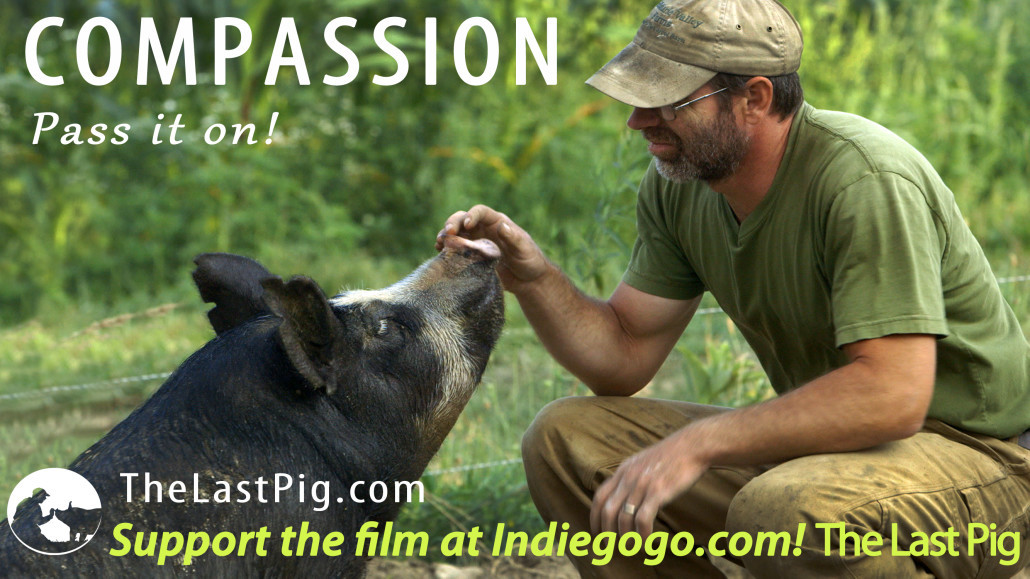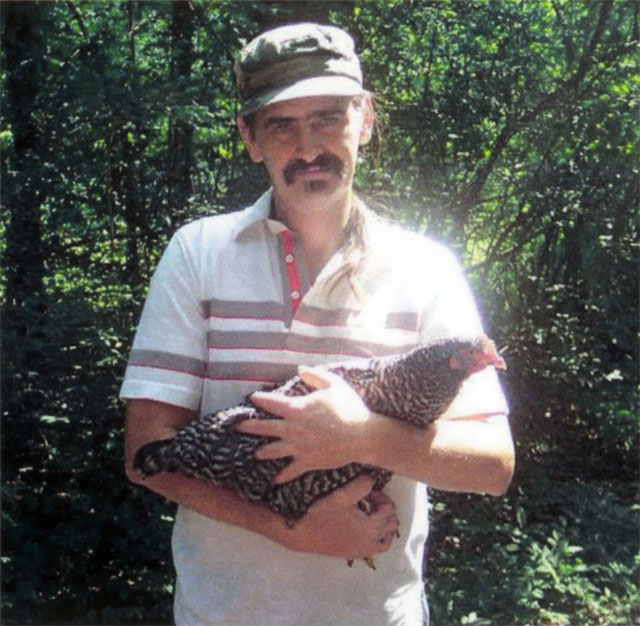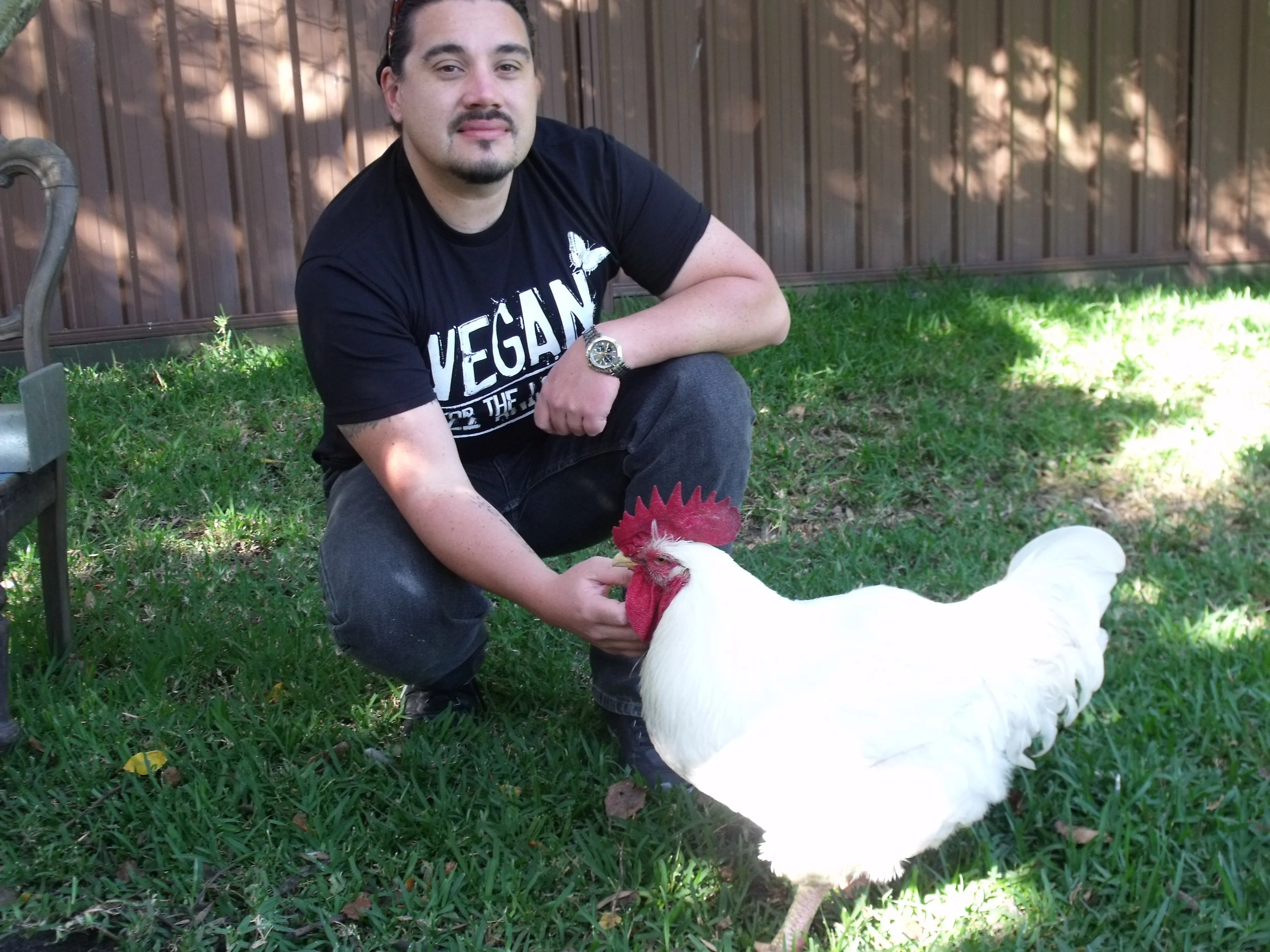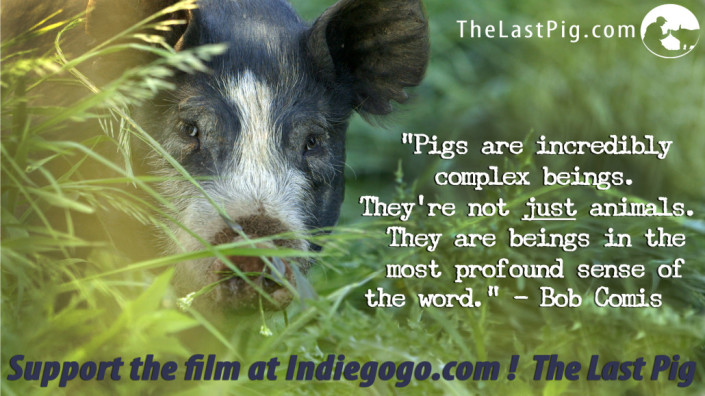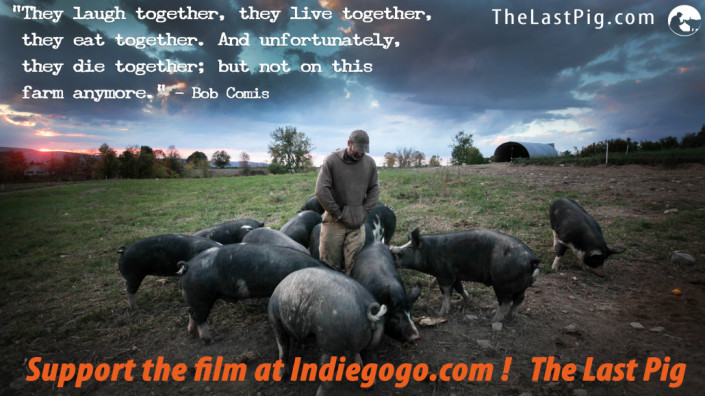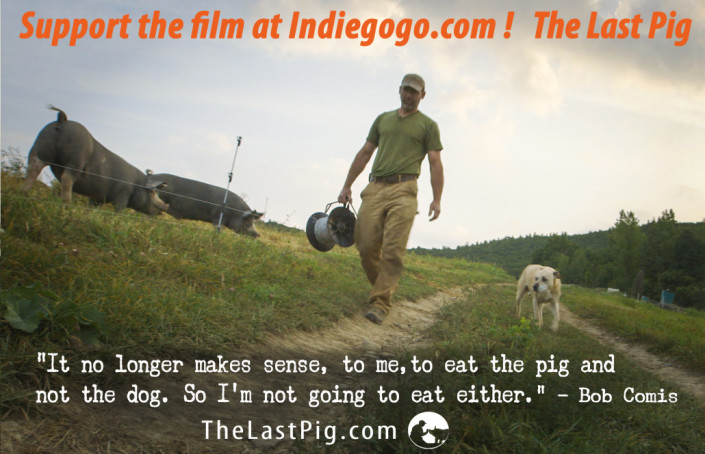Awakened Compassion: Former Slaughterhouse Workers Turned Animal Rights Activists
"Their senses are in overload. They smell and taste the feces, blood and steam in the air. ... One-way gates prevent the animals from backing away in fear. Many get caught as they sprint forward to remain close to a friend for comfort."* - Josh Agland
"One night a guy on the end of the line got really aggravated and picked up a piece of pipe about 2 ft. long.... He started whacking the chickens' heads off with it like a baseball bat.... The heads would travel across the room and hit the wall about 10 ft. away and just splatter like tomatoes against the wall."†† - Virgil Butler
"There were about twenty calves hanging on the hooks, some of them beheaded, their bodies still trembling. On the table the eyes of some chopped off heads were still twinkling..."** - Peter Razpet
"... also saw sheep who had been electrically stunned, but had regained consciousness before the 'executioner'...could slit their throats. ...many of the carcasses I trimmed had dog bites on them. ...inflicted by the dogs in the holding pens before the sheep were shunted through to their deaths. This was after enduring a long journey on a cold, rattly truck, at high speed."† - Carl D. Scott
"Was this the purpose they were put on Earth for? I asked myself that question over and over as I saw them coming out of the cattle trucks and into the corrals and even jumping the corrals and fearing for their lives, running down the avenue, and taking on automobiles head-on, crashing into them."‡ - Ed Calles
There is no shortage of accounts of former slaughterhouse workers or animal farmers who had a change of heart after years of contributing to the mass slaughter of innocent animals. There's Josh Agland, a former slaughterhouse worker who became an advisor for Australian animal rights politician, Mark Pearson of the Animal Justice Party. Josh was initially too ashamed to talk about his three years working at a slaughterhouse, until he realized it wasn't about him. It was about the animals brutally and mercilessly slaughtered every day whose stories needed to be told.
It's about the "ex-dairy cow with protruding hips and large pink X spray painted on her back" who "Exhausted and depleted...collapsed onto the cold concrete floor of the slaughterhouse. Instead of euthanizing her, on-site vets made the decision to leave her overnight and kill her for meat first thing in the morning, when the line could be slowed. She was pregnant when she was killed, her baby cut from her stomach."*
It's about the steer at the hide puller station, who was "still kicking, shaking his head and bellowing—two of his legs, his tail, and his genitals had already been removed at previous stations. Josh says many workers saw the skin being pulled and sliced off the live animal’s body. Josh reported the incident but was ignored by superiors who hadn’t been present and denied that it happened."*
Then there's Carl D. Scott, a former slaughterhouse worker (or "Meatworker") who also hunted and trapped animals for meat or fur until his conscience caught up to him. Now vegan, he said something I hope many people come to realize, "I listen to my conscience a LOT these days. It pays to. Ignoring it makes you sick. Soul sick."†
And after 25 years of working in slaughterhouses and a series of eye-opening, life-changing events, Peter Razpet of Kamnik, Slovenia realized that "animals have soul too, they feel the pain, love us maybe more than we love ourselves and others. They want to tell us something, teach us something.... They had their meaning."**
Bob Comis, a former pig farmer turned vegan and veganic vegetable farmer, to this day struggles to forgive himself for the 2,000 pigs he raised and sent to slaughter. Although the emotional trauma of raising pigs for slaughter is nothing like the bloody act of killing them, Bob's realization of pigs' inherent nature of forgiveness is just as heartbreaking and haunting, given what he did to them:
"Pigs, like many, if not most nonhuman animals, are almost unconditionally forgiving. No matter the abuse they suffer, no matter the deprivation, no matter the psychological horrors they are put through by thoroughly callous people with a profound disregard for the depth and intensity of their being, pigs, given ample physical and psychological space and time, will forgive humans completely. While it might be difficult for them to do so, and while there might be lasting psychological effects of their trauma, (almost) every pig will welcome humans back into the herd."
Breaking the Trance, Making the Connection
These ex-slaughterhouse workers have seen hell on earth, and managed to avoid being eternally consumed by the voracious fires of apathy, sadism and depravity. Even they were able to reawaken their compassion and empathy, snapping out of their trance and truly seeing the horrors of the meat, dairy and egg industry.
Nathan Runkle, Founder and President of Mercy for Animals, once said this about Virgil Butler, the late famed former slaughterhouse worker turned animal rights activist:
“[Virgil is] one example of the power of the human spirit—how we all have the ability to pivot and move in the direction of kindness and compassion, no matter what our background is, no matter how deeply engrained you may feel you are in supporting these industries.”
If these former slaughterhouse workers who must have felt like a big part of their souls died every day they went to work, and are continuously haunted by the smell, sights and sounds of death, and who can never completely wash their blood-stained hands rife with guilt because of the irreparable emotional and mental toll that killing animals must have on them … if even they can awaken their empathy and compassion, and do a complete 180, then there should be no reason for those who support this industry through their diet and lifestyle to not be able to do the same.
Not convenience. Not custom. Not taste.
The Endless Cycle of Violence and Victimization
I used to think that majority of slaughterhouse workers were psychopaths; although, let’s be real, there are people who get a sick satisfaction and rush from abusing and killing animals (in such cases, it's because of the violent criminals who tend to gravitate toward these jobs). But after reading stories of former slaughterhouse workers turned animal rights activists, as well as Dr. Melanie Joy's book Why We Love Dogs, Eat Pigs and Wear Cows, I realized that slaughterhouse workers are victims themselves.
It's the inhumane conditions, mental/emotional trauma, and demands of their jobs that make them desensitized and jaded, aggressive, violent and abusive, self-destructive and socially withdrawn. Many workers are even increasingly being treated with post-traumatic stress disorder (PTSD), which is why "researchers are finally starting to systematically explore the results of killing sentient animals for a living."***
Slaughterhouse workers are merely caught in a never-ending cycle of violence and victimization. Workers inflict violence upon animals—the true victims—until the workers themselves become victims from the violence they're forced to unleash...minute after minute, hour after hour, day after day. It's not normal to kill, and these stories of ex-slaughterhouse workers reflect that. They're mere cogs in the killing machine, urging us to examine the larger issue here: the systemic problem of the animal agriculture industry and the corporations that fund it.
Sadly, the true “murderers” are the general public—those who consume meat, dairy and egg products, whether they’re aware of their complicity or not. No one is forcing them to do it, whereas slaughterhouse workers do it to earn a living (with the exception of those who get a sick thrill out of it). In many cases, slaughterhouses are the only viable job opportunities in rural and low-income areas with limited educational prospects. Also, many slaughterhouses deliberately employ undocumented immigrants with limited means to support themselves and their families; they know they're desperate for jobs and can be easily manipulated and exploited.‡‡
And when workers try to show compassion for the animals—like stopping a kill line because a cow wasn’t properly stunned and is still completely conscious, seconds away from meeting a violent and gruesome death—then they’re financially punished by their employer, and scorned by their coworkers for not meeting their daily kill quota.* If they're undocumented workers, then they face the threat of deportation.‡‡
You can read more about the inhumane conditions of slaughterhouse workers here.
“If Slaughterhouses Had Glass Walls”
I really believe that if slaughterhouses had glass walls, and if they were located in densely populated areas—cities and suburbs—people would become vegan. Otherwise, it's out of sight, out of mind, as is the case.
But slaughterhouses shouldn’t need glass walls to prove that theory. What I hope this blog post shows, and a quick online search for “former slaughterhouse workers turned animal rights activists”, are the numerous stories of people who quit their jobs, became vegan and/or dedicated the rest of their lives to fighting for animal rights after witnessing the horrors behind slaughterhouse doors. While many people will argue that killing animals is natural—that animals are here for us to consume—it's hard to argue against or discredit what these ex-slaughterhouse workers experienced that compelled them to walk away from their jobs. It's a decisive act that has to make you wonder.
Why else would these slaughterhouse workers, many of them without the financial means to quit their jobs, do so?
Ed Calles, a Vietnam War veteran, worked at a beef slaughterhouse upon his return. This is someone who had seen his fair share of disturbing things. And yet, he said that seeing animals being led to their deaths really impacted him:
"Eventually, I became desensitized. But in my heart of hearts, I knew there was something wrong here. I didn’t know exactly what. Guys carried on in a bloodthirsty kind of lifestyle. During work...men drank all night long; (they were) severely intoxicated. But they did their job.
And I was offered a lot to drink, but I couldn’t. Now looking back at it, I think they had to. Because it was their way of desensitizing themselves. I just wanted to be at peace with myself and everybody around me, but I just couldn’t find it there."‡
And then there are the powerful testimonies of Virgil Butler on his blog that make you feel every ounce of his inner turmoil:
"The sheer amount of killing and blood can really get to you after awhile, especially if you can't just shut down all emotion completely and turn into a robot zombie of death. You feel like part of a big death machine. Pretty much treated that way as well. ... Out of desperation you send your mind elsewhere so that you don't end up like those guys that lose it. … To keep your mind from drowning in all those hundreds of gallons of blood you see. … You begin to feel a sense of disgust at yoursef [sic] at what you have done and continue to do. You are ashamed to tell others what you do at night while they are asleep in their beds. You are a killer. … You shut down all emotions eventually. You just can't care about anything. Because if you care about something, it opens the gate to all those bad feelings that you can't afford to feel and still do your job. … You can't have a strong conscience and kill living creatures night after night. … Welcome to the nightmare I escaped.”††
Whether it's the soul they saw in the animals' eyes, or the profound emotions that animals are capable of feeling, or the tipping point of seeing/committing one too many senseless murders of innocents, these slaughterhouse workers knew they couldn't lead normal lives and find inner peace if they continued with their profession.
To me it speaks volumes and carries just as much weight as the graphic images and videos we see of the unfathomable abuse and violence inflicted on animals. It shows that killing is killing—whether it's taking a person's life or an animal's life. The psychological effects of those who do the killing for us run deep; the trauma and emotional scars last forever.
Your Own Awakening: The Vegan and Non-Vegan Kind
If you're vegan and are one of those people who, like I once did, points fingers at slaughterhouse workers and thinks the worst of them, I hope that this has helped open your eyes to see the bigger picture: that many of them are also victims of the system. I hope that you are compelled to read more of their stories, and share them with others to raise awareness and inspire others to work toward a compassionate world, one in which slaughterhouses no longer exist.
If you're not vegan, I hope that you realize the extent of the consequences of a meat-, dairy- and egg-based diet. It's not just an animal welfare issue, it's also a human welfare issue. It's easy to look down on those who do the killing for you. It's easy to think animals are meant to be eaten when you're not the one killing thousands of them per hour every day. It's easy to be disconnected from how our food is processed when your senses aren't overwhelmed by the sights, sounds and smell of violent deaths. And it's easy to be indifferent or forget what you've learned about slaughterhouse horrors when you're at the grocery store and everything is wrapped in a pretty package for you.
I can only hope that the stories of these former slaughterhouse workers help awaken your compassion and empathy, that they move you enough to act according to your conscience ... and shift away from a diet and lifestyle that inflicts harm and suffering on others—both humans and animals.
Sources:
*Pippus, Anna (2016, May 31). Meet the Former Slaughterhouse Worker Who Became an Animal Rights Activist. Huffington Post. Retrieved from http://www.huffingtonpost.com/anna-pippus/meet-the-former-slaughter_b_10199262.html
††Retrieved from http://cyberactivist.blogspot.com/
†Retrieved from https://www.facebook.com/notes/carl-d-scott/from-slaughterhouse-worker-to-vegan-a-strange-journey/137704629618232/
**Retrieved from http://www.all-creatures.org/articles/ar-confessions.html (Original Source: Abolitionist-Online.com)
***McWilliams, James (2012, February 7). PTSD in the Slaughterhouse. The Texas Observer. Retrieved from https://www.texasobserver.org/ptsd-in-the-slaughterhouse/
‡Retrieved from http://suprememastertv.com/services_subt.phpbo_table=stop_cruelty&wr_id=97&subt_cont=aw&show=aw
‡‡Lucas, Sarah (2016, January 20) Animal Agriculture and Slaughterhouse Workers. In Defense of Animals. Retrieved from http://www.idausa.org/animal-agriculture-slaughterhouse-workers/
